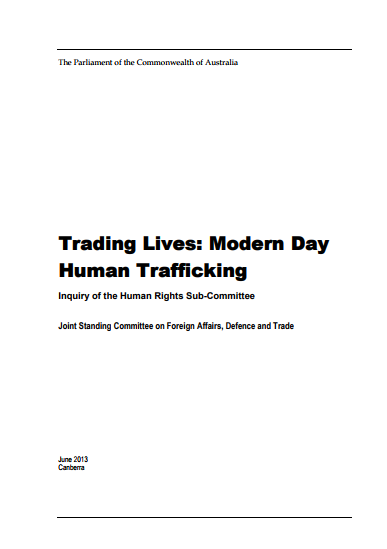Introductory Chapter
Conduct of the inquiry
1.1 On 13 August 2012, the Minister for Foreign Affairs, Senator the Hon Bob Carr, asked the Committee to inquire into and report on Slavery, Slavery like conditions and People Trafficking. The terms of reference of the inquiry were to:
…inquire into and report on slavery, slavery like conditions and people trafficking with a particular focus on:
- Australia’s efforts to address people trafficking, including through prosecuting offenders and protecting and supporting victims;
- ways to encourage effective international action to address all forms of slavery, slavery-like conditions and people trafficking; and
- international best practice to address all forms of slavery, slavery-like conditions and people trafficking.
1.2 The Committee invited an array of stakeholders, and groups and individuals with established interest in human rights to submit to the inquiry, including relevant government departments, non-government organisations (NGOs), and civil society groups in Australia.
1.3 The Committee received 74 submissions and 41 exhibits from a range of Government Departments, non-government organisations, civil society groups, and individuals within Australia and the region.
1.4 The Committee also took evidence from 39 organisations and individuals at ten public hearings held in Canberra, Sydney, and Melbourne over the course of the inquiry.
Structure of the report
1.5 The Committee’s report is structured around the inquiry’s terms of reference. This introductory chapter provides an outline of the conduct of the inquiry.
1.6 Chapter two provides an overview of the international and domestic definitions of slavery, slavery-like conditions and people trafficking.
1.7 Chapter three examines the current extent of slavery, slavery-like conditions and people trafficking in Australia including details of the investigations, prosecutions and convictions; research on slavery and people trafficking; and the community perceptions of slavery and people trafficking in Australia.
1.8 Chapter four focuses on the Australian Government response to people trafficking nationally as well as international efforts to combat slavery, slavery-like conditions and people trafficking.
1.9 Chapter five provides an overview of Australia’s efforts to support victims of trafficking and slavery including the people trafficking visa framework, the support for trafficked people program and suggests additional support for victims of trafficking.
1.10 Chapter six examines exploitation in product supply chains and Chapter seven looks at community perceptions on international best practice.
See the report online here.

